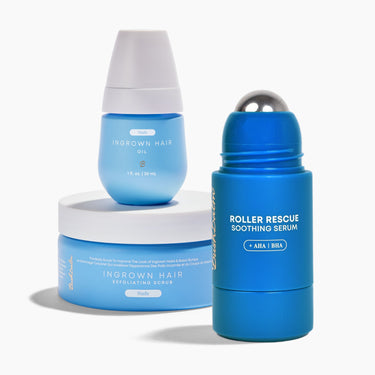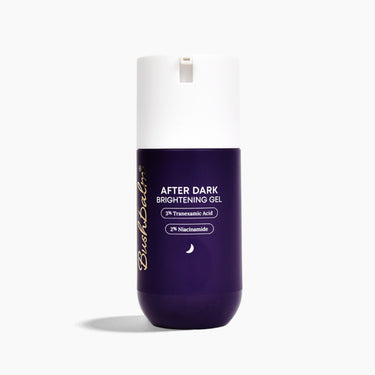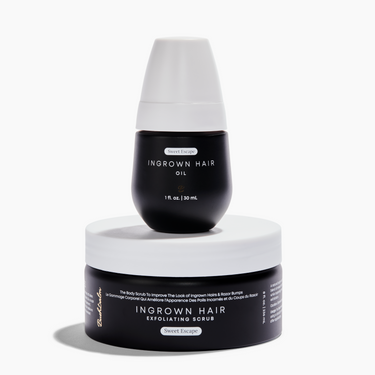Cleaning Your Vagina & Vulva
Table of Contents
Where You Should Be Cleaning Down ThereHow To Properly Clean Your Vulva
Vulva Cleaning Tips from a Gynecologist
What To Look For in Vaginal Cleansers
Other Ways to Take Care of Your Vagina
- You Are What You Eat - And So Is Your Vagina.
- Let Your Vagina Breathe While You Sleep
- Wipe Your Vagina From Front To Back
- Change Out of Sweaty Clothing ASAP
- pH Balanced Products are the Vulva’s Best Friend
Main Takeaways on Cleaning your Vagina & Vulva
Can you remember learning how to clean your vagina properly? Me neither. The topic of vaginal hygiene is often overlooked and avoided. This trend creates a lot of confusion for women trying to figure out the best way to maintain a clean and healthy vagina.
Keep reading to learn more about the do's and don'ts when it comes to vaginal washing. This post will do a deep dive into how to wash your vagina (actually your vulva), as well as other tips for caring for your vagina. Let’s get into it!

Where You Should Be Cleaning Down There
First of all, it’s extremely important to note that you should not clean your vagina. Nothing should go inside of the vagina - no water, douching, or products. A vagina is a self-cleaning machine that will continue to clean itself. It has bacteria that are necessary to help with the daily cleaning of the vagina.
What you can and should be cleaning is your vulva. The vulva is the outer part of the female genitals. The vulva includes the labia (aka “lips”), clitoris, and clitoral hood. You can clean your vulva the same way you clean the rest of your body - just with a bit more caution and care. Here are some easy steps to follow next time you are cleaning down there, as well as a recommendation for what to use as a vaginal wash.

How to Properly Clean the Vulva
- Cleanse
- Rinse
- Exfoliate
- Rinse
- Apply soothing oil
Cleanse
A soothing shower cleanser will ensure that no dirt, oil, and bacteria get near the vaginal opening. When in the shower or bath, wash your vulva with warm water (make sure the water is not too hot!) and a gentle all-natural cleanser that is safe for sensitive skin, and pH balanced. Separate your labia and let the warm water and cleanser clean all around the clitoral hood and between your labia.
Rinse
Exfoliate
Exfoliating the pubic skin is important for two reasons:
- Exfoliants soften the skin and hair
- Exfoliating gives the pubic skin a deep clean
First, Bushbalm™ exfoliating scrubs soften the skin and hair. The softer the pubic hair and skin, the lower the risk of razor bumps, ingrown hairs, itchy pubic hair, and dark spots become. Soft skin allows the razor to glide seamlessly across the skin. Soft hair enables the blade to slice through the hair with minimal tugging. These two factors make the occurrence of razor bumps and/or ingrown hairs much less likely. Without razor bumps or ingrown hairs irritating the skin, the risk of dark spots decreases since hyperpigmentation and discoloration are the body's response to wounds/irritation. Finally, soft pubic hair means that itchy pubic hair is less likely to occur. Pubic hair is very coarse and is quite irritating as it rubs on the skin. Softening pubic hair is a blessing for pubic skin.
Second, exfoliation works to remove dead skin cells and unclog the pores. Using a combination of nourishing ingredients and essential oils, Bushbalm™ sugar scrubs will deep clean out the pores and let your skin breathe. Clogged pores can lead to razor bumps and ingrown hairs. Normally, the hair is supposed to grow up from its root and through the pore (the skin’s opening). When the pore is clogged, the hair strand cannot break through the opening and instead will curl back down underneath the skin’s surface - causing an ingrown hair or a rash of razor bumps. These skin concerns can irritate the skin and lead to scarring and dark spots appearing long after the wound is gone.
Rinse
Apply a soothing oil
Having a nourishing treatment oil can do wonders for your pubic area. Pubic hair is unlike any hair on the rest of our body. Pubic hair is more thick, coarse, and wiry than the hair on our legs, chests, backs, underarms, and scalps. As such, pubic hair can cause a lot of irritation on pubic skin. The pubic region is prone to dark spots, razor bumps, ingrown hairs, and itchiness (among other things). An effective treatment oil will soothe the skin and heal any skin irritations.
We recommend applying your soothing treatment oil within 2 minutes of stepping out of the shower. According to dermatologists, this window is the optimal time to apply any moisturizers to the skin because the skin is most absorbent at this time.
Before we move on, let's establish why it is important to incorporate pH balanced products into your vaginal hygiene routine.

The importance of using pH balanced products around the vagina
pH stands for potential for hydrogen. The pH level of the skin refers to how acidic or alkaline the skin is on a scale from 1-14. On the pH scale, 7 is neutral, below 7 is acidic (0 being the most acidic), and above 7 is alkaline (14 being the most alkaline). A normal vaginal pH level ranges from 3.8 to 4.5 (on the acidic side). An acidic pH kills bacteria and keeps the skin balanced, hydrated, and rejuvenated. An acidic pH helps keep your skin balanced, hydrated, healthy, and radiant.
So what does all that mean? Simply put, the skin must maintain a balance of acidity and alkalinity in order to combat germs, fight infection, retain/store nutrients and minerals and protect you against external stresses.
If the pH balance is off, the skin can have adverse reactions. See for yourself:
- When the pH balance is too alkaline, one may experience acne, dryness, accelerated aging (fine lines and wrinkles). This can lead to conditions like eczema.
- When the pH balance is too acidic, one may experience inflammation and irritation. This effect is similar to what would happen if you put a harsh chemical peel on your skin; the skin becomes "burnt", sensitive, irritated, and prone to breakouts.
When the vagina is pH balanced on the interior and exterior, good bacteria will thrive and protect this intimate area from bad bacteria and yeast. On other hand, when the pH balance is thrown off this can lead to an imbalance in bacteria and yeast levels which puts you at risk of developing a number of infections such as UTIs, yeast infections, vaginal odor, or bacterial vaginosis. Bottom line: only ever use products that are pH balanced around the vagina and on the vulva.
For more information on the ideal ingredients to look for in your skincare products, check out this blog.
How To Clean Your Vagina On Your Period
Remember, a vagina is self-cleaning. This does not change while on your period. Blood will naturally flow out without any additional help. However, you can help your vagina self-clean by changing your pad and/or tampon regularly. Depending on your flow, you should change your tampon every 4-8 hours. A pad should be changed every 3-4 hours. If you are feeling icky down there during your period, you can wash your vulva with warm water 2-3 times a day while on your period.

Vulva Cleaning Tips from a Gynecologist

We asked Dr. Ruth Arumala, a board-certified gynecologist to provide us with insight and expert tips on how to keep your vulva clean without irritating this sensitive area. Here’s what Dr. Ruth Arumala had to say:
“I do not tell my patients to use soap when it comes to cleaning the vulva, it’s too harsh.. I tend to recommend and use a soft and foamy cleanser that includes natural oils and is pH balanced - like Bushbalm’s Skincare’s Nourishing Body Wash”.
“You never want to have squeaky clean skin in that area. Think about shampoo and your hair when it feels squeaky clean the natural oils have been stripped away. We don’t want our skin in sensitive areas to feel like that. Once you're finished you want to pat dry so no yeast grows. After the water has dried off, you should apply a soothing oil.”
What To Look For in Vaginal Cleansers
Jojoba Oil (Simmondsia Chinensis Seed Oil)
Jojoba Oil is a soothing ingredient that coats the top layer of the skin in order to retain moisture and prevent the skin from drying out. This coat is rich in fatty acids and packed with Vitamin E, A, and D making it the ideal ingredient to preserve the skin’s natural moisture and restore/maintain a balanced pH level.

Tea Tree Oil (Melaleuca Alternifolia)
Packed with antibacterial, anti-inflammatory, antiviral, and anti-fungal properties, Tea Tree Oil is a natural healer fit to combat any bad bacteria down there. This star ingredient is the key to fighting off yeast or fungus growth around your vagina. This ingredient will also keep the vulva moisturized enough to be healthy but not too moist so bad bacteria can grow.

Copaiba Balsam Essential Oil (Copaifera Spp)
A major property of Copaiba Oil is Beta-caryophyllene; Beta-caryophyllene has anti-inflammatory, antimicrobial, antibacterial, and antioxidant properties. Like Tea Tree Oil, Copaiba is an all-natural anti-inflammatory agent that will heal skin irritations such as bad bacteria.

Grapeseed Oil (Vitis Vinifera Seed Oil)
Grapeseed Oil protects and preserves the skin's soft and supple appearance. The ingredient has properties such as vitamin E and phenolic antioxidants which work together to remove bacteria from the surface of the skin. This lightweight oil penetrates the skin and activates Vitamin E and C in the skin which protects and preserves the skin from external agents.

Aloe Vera
Aloe is an amazing source of antioxidants and vitamins that help protect the skin.
Glycerin
Other Ways to Take Care of Your Vagina
You Are What You Eat - And So Is Your Vagina.
What you decide to put in your body can have either positive or negative effects on your vagina. Dr. Ruth Arumala recommends eating good probiotics (such as yogurt, gummies, or probiotic pills). Foods high in probiotics help prevent yeast infections, vaginal odor, and bacterial vaginosis. Probiotics balance out the pH levels in the vagina which translates to a healthy and happy vagina.
5 main foods to avoid/eat in moderation
Now, let’s talk about food to steer clear of. There are 5 main foods to steer clear of OR eat in moderation in order to promote vaginal health:
- Processed foods
- Coffee
- Alcohol
- Sugar
- Onions.
These foods either bring down your immunity or alter the pH balance of your vagina. This causes the vaginal region to become prone to infections and/or smell unpleasant (for lack of a better word).
Let Your Vagina Breathe While You Sleep
According to Dr. Ruth Arumala, bad bacteria that cause vaginal infections do not like oxygen. So it’s important to allow oxygen to flow down there while you sleep to minimize bad bacteria and maintain a healthy vagina.
Wipe Your Vagina From Front To Back
The right way to wipe the vagina after peeing is from front to back. It’s also important to not over wipe to ensure you don’t irritate your skin.
Change Out of Sweaty Clothing ASAP
On that note, change out of your sweaty gym clothes right after your workout! Bad bacteria breeds in wet and dark spaces. By getting out of your wet clothing asap you will inhibit the multiplying process and save your vagina from bad bacteria.
Establish 3 Ground Rules In the Bedroom
There are 3 important rules to keep in mind before you and your partner have sex:
- Wash your hands
- Clean your sex toys
- Pee before & after sex
Wash your hands
Our hands carry lots of bacteria; this bacteria has no place being inside the vagina. This bacteria can cause UTIs, yeast infections, bacterial vaginosis, and other uncomfortable infections that are completely avoidable if you take the time to clean your hands.
Clean your sexy toys
After use, sex toys should also be washed and stored in a dry, clean space. You can clean your sex toys with the same gentle cleanser you use to clean your vulva.
Pee before & after sex
Peeing before and after sex is crucial for vaginal health. If one does not pee right after, she runs the risk of developing a UTI. Ridding yourself of all urine before and after sex gives bacteria less time to multiply and develop into a urinary tract infection.
Other ways to keep your vulva healthy
To maintain a healthy vulva you'll want to use a few other products. Below are the recommended choices for healthy skin around your vagina.
Dark Spot Treatment Oil

Ingrown hairs can be quite irritating to the skin. As a result, these pesky bumps can leave behind dark spots and scars long after they're gone. The Bermuda Oil formula gently breaks down melanin that is built up in the skin and over time will help you achieve a more even skin tone. The combination of fractionated coconut carrier oil, lemon essential oil, and rare copaiba oil work to even and diffuse the appearance of dark spots and blemishes.
Ingrown Hair Prevention Treatment Oil

As noted by dermatologist Marc Glashofer, the role of pubic hair is to prevent “friction during intercourse that can cause skin abrasion and rashes”. As such, the texture of pubic hair tends to be thicker and more coarse in order to maximize protection. Pubic skin and hair must be soothed and softened after hair removal to ensure that the hair grows back seamlessly - without creating an unbearable itch.
Using a treatment oil is a great way to get this job done. Bushbalm’s treatment oils are packed with a combination of rich oils that combat dryness and replenish your skin after hair removal. Each formula is infused with Tea Tree Oil - a natural healer with antibacterial, anti-inflammatory, antiviral, and anti-fungal properties. This star ingredient provides a soothing sensation to calm redness, swelling, and inflammation.
Ultra Exfoliating Sugar Scrub

When it comes to the bikini area, exfoliation provides even more benefits! Using a hydrating exfoliant will soften the skin while simultaneously unclogging the pores - two birds, one stone.
Our Bushbalm™ exfoliating sugar scrubs will give your skin an irresistibly smooth look and feel. Each scrub is packed with star ingredients like Jojoba Oil and Copaiba Oil which coat the skin to create a hydrating protective barrier to external agents.
Main Takeaways on Cleaning your Vagina & Vulva
- NEVER clean inside the vagina; she is a self-cleaning machine that knows what she’s doing.
- Regularly clean the vulva (outer part of the female genitals) as you would the rest of your body.
- Use a pH-balanced gentle cleanser when cleaning down there - NOT harsh soaps.

We hope that this guide on how to maintain vaginal health answered some of the questions which are often not addressed. If you have any other questions, feel free to DM us on Instagram @bushbalm and we will answer your questions as soon as possible.




















